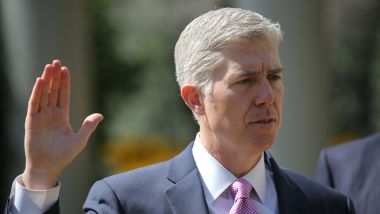 oped: I concur and agree with Neil Gorsuch/SCOTUS...being that Neil is a strict Constitutionalist as was Scalia...you cannot take away ones Constitutional/Bill of Rights for anothers...both must be respected!
oped: I concur and agree with Neil Gorsuch/SCOTUS...being that Neil is a strict Constitutionalist as was Scalia...you cannot take away ones Constitutional/Bill of Rights for anothers...both must be respected!
by: Michelangelo Signorile
It brought out some Gorsuch defenders, including some
of his students (at the University of Colorado, Boulder, where Gorsuch
taught) and friends of Gorsuch, who responded to me on Twitter and
elsewhere, some angrily, accusing me of wrongly portraying Gorsuch as a
homophobe.
Just this past week, the gay author and blogger Michaelangelo
Signorile published a piece in The Huffington Post headlined: “Why Neil
Gorsuch Likely Believes It’s Perfectly Fine to Ban Gay Sex.” In it, he
argued that Judge Gorsuch “may be all mild-mannered and cuddly, but that
doesn’t mean he wouldn’t in a heartbeat deny your very existence under
the Constitution if you happen to be queer.”
The Times article seemed almost designed to counter those kinds of opinions ― which were based on Gorsuch’s
judicial decisions and writings
― by presenting us with Gorsuch’s gay friends, who spoke glowingly of
him as a person. In the piece, by Sheryl Gay Stolberg, we meet Phil
Berg, smartly photographed specifically for the story in a suit on the
steps of a majestic courthouse, along with his husband, Ronald Riqueros.
Berg, who went to Harvard with Gorsuch, spoke in the article about the
“special bond” he and Gorsuch have had for many years, and explained how
supportive Gorsuch is of him and his husband: “We have had a standing
invitation to stay with Neil and Louise in Denver.”
The former Gorsuch clerk, Joshua Goodbaum, was interviewed, too,
explaining that Gorsuch was “thrilled” for him and his husband when they
got married in 2014. Ken Mehlman, the former Republican National
Committee chairman and former campaign manager for George W. Bush, who
came out as gay a few years ago and helped in the fight for marriage
equality, was also described as a friend of Gorsuch’s, who, according to
the article, was “circulating a letter of support for the judge and
posted a congratulatory message to Judge Gorsuch on his Facebook page.”
Christian
Mammen, described as “a Democrat” and someone who “grew close” to
Gorsuch when they were at Oxford together, was referred to in the piece
as one of several friends who, rather than viewing Gorsuch as in the
mold of Scalia, “wonder if his jurisprudence might be closer to that of
Justice Anthony Kennedy who has carved out a name for himself as the
court’s conservative defender of gay rights.”
“Everybody’s got him pegged as being more Scalia,” Mammen is quoted as saying. “I’m not sure I see that.”
But as
I pointed out in a second piece I
published later that day in response ― drawing upon the analyses of the
highly regarded Supreme Court reporters, Linda Greenhouse of the New
York Times and Nina Totenberg of National Public Radio, specifically on
the histories of both LGBT rights and originalism at the Supreme Court ―
this was naive at best, as Justice Kennedy is
not an originalist:
It’s not “everybody” else who
has Gorsuch pegged as being like Scalia ― it’s Gorsuch who has
willingly, unequivocally pegged himself that way. He gave a major speech
about the importance of the late justice and his philosophy last year
and, again, publicly adheres, like Clarence Thomas, to Scalia’s
philosophy of originalism. Based on that and his decisions, the Times
put Gorsuch on a chart as just to the right of Scalia, with only Thomas
further to the right. And, much as Gorsuch’s gay friends would like to
believe otherwise, Justice Kennedy is not an originalist. In
fact, his sound rejection of originalism is what had him lead the court
majority in ruling that gays are protected against discrimination in the
Constitution, should not be criminalized, and most certainly have the
right to marry.
And now we have the proof of just how wrong Gorsuch’s friends were,
looking at the actions of the court this week. Gorsuch revealed a
dangerous disregard for the
Obergefell marriage equality decision, in the 6-3 ruling that
overturned an Arkansas law that
prevented both parents in a same-sex marriage from being named on the
birth certificate when one gives birth to a child ― as is the case for
heterosexual marriages in the state. Gorsuch took pride in
writing the dissent,
joined by far-right Justices Thomas and Alito, clearly supporting flat
out discrimination and ignoring precedent ― something even Justice John
Roberts, who dissented in
Obergefell but joined the majority in this case, would not do.
Slate legal writer Mark Joseph Stern, noting that Gorsuch is “everything that liberals most feared,”
explained how Gorsuch is laying the groundwork to harm or even reverse
Obergefell:
On Monday, Gorsuch indicated that he opposes equal rights for same-sex couples,
dissenting from a ruling that requires states to list same-sex parents on birth certificates ... That, alone, is startling: In
Obergefell v. Hodges,
the court held that the Constitution compels states to grant same-sex
couples “the constellation” of “rights, benefits, and responsibilities”
that “the states have linked to marriage,” including “birth and death
certificates.”
Obergefell, then, already settled this issue. Gorsuch’s dissent suggests he may not accept
Obergefell as settled law and may instead seek to undermine or reverse it.
The court also
announced it would take the case
of a Colorado baker who was penalized for refusing to serve a gay
couple ― a couple that wanted a wedding cake but hadn’t even yet
discussed design with the baker, and were turned away when they simply
identified they were having a same-sex wedding. Many legal observers
believed that when the court didn’t take a similar case a few years ago
that involved a wedding photographer in New Mexico, it was deferring to
state sovereignty in states like Colorado and New Mexico where LGBT
people are protected under state law against discrimination in public
accommodations. Ian Milhiser, justice editor at Think Progress, weighed
in:
It takes
four justices for the court to accept a case. It’s hard to believe that
Gorsuch is even farther to the right on this issue than Scalia. But
Scalia did have a reverence for states’ rights, while Gorsuch seems to
have
a fetishistic obsession with “religious liberty.”
As I’ve described in looking at his opinion on
Hobby Lobby while he was a judge on the 10th Circuit Court of Appeals, he went much further than both Justice Alito, who wrote the
Hobby Lobby decision for the Supreme Court, and Kennedy, who wrote a concurring opinion.
Both Alito and Kennedy held that
it was constitutional for the arts and crafts chain to deny certain
forms of birth control to women in its employer-sponsored health care
plan, but put limits on the decision regarding discrimination against
other groups. LGBT legal experts believed Kennedy’s concurring opinion
specifically protected against religious exemptions regarding LGBT
rights. But Gorsuch, in his 10th circuit decision, had issued no
caveats, no limits.
Last week
I thought that
the first case to be the test of the reach of Gorsuch ’s view of
religious liberty might be the abominable Mississippi law that a federal
appeals court allowed to go into effect ― considered the worst
anti-LGBTQ law ever by many LGBTQ activists and legal experts.
But
obviously that will likely be the second act, after the Colorado baker
case. All of this is part of the long-term strategy I’ve written about,
interviewing those on the right and attending their conferences, in
which religious conservatives, dealt a blow by
Obergefell, will now work ― as they did regarding
Roe v. Wade ― to weaken the decision, and try to
turn same-sex marriage in second-class marriage.













